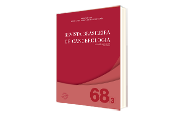Distress in Cancer Patients in Brazil: Integrative Literature Review
DOI:
https://doi.org/10.32635/2176-9745.RBC.2022v68n3.2402Keywords:
neoplasms/psychology, psychological distress, review literature as topic, BrazilAbstract
Introduction: Cancer patients experience a series of changes in their lives due to diagnosis and treatment and the emotional aspect is one of those affected by this process. The term “distress” was chosen to refer to the emotional suffering that cancer patients experience. Objective: To identify how distress in cancer patients has been addressed in studies carried out in Brazil. Method: An integrative review of the scientific literature on distress carried out in September 2020. To search the databases, the descriptor “Neoplasms” and the term “Distress” were used. Articles available in full published in Portuguese, English or Spanish were selected, with the subject Country/Region: Brazil, without time cut, in the LILACS, MEDLINE and BDENF databases. The critical reading step was conducted to analyze and synthesize the articles. The articles selected were organized and presented as a table and the interpretation of the results in categories. Results: The final sample of this review consisted of nine articles which pointed out instruments capable of identifying and/or measuring distress, discussed the factors associated with the presence of distress and the factors impacting its reduction. Conclusion: Cancer patients can experience distress at any stage of the disease. In view of the scarcity of articles about distress in the Brazilian scenario, it is recommended that more studies are developed in order to deepen and substantiate the theme.
Downloads
References
National Comprehensive Cancer Network [Internet]. Plymouth Meeting (PA): NCCN; c2022. Distress management; [cited 2020 Nov 2]. Available from: https://www.nccn.org/guidelines/guidelines-detail?category=3&id=1431
Albuquerque KA, Pimenta CAM. Distress do paciente oncológico: prevalência e fatores associados na opinião de familiares. Rev Bras Enferm. 2014;67(5):744-51. doi: https://doi.org/10.1590/0034-7167.2014670511 DOI: https://doi.org/10.1590/0034-7167.2014670511
Bultz BD, Carlson LE. Emotional distress: the sixth vital sign – future directions in cancer care. Psychooncology. 2006;15(2):93-5. doi: https://doi.org/10.1002/pon.1022 DOI: https://doi.org/10.1002/pon.1022
Schilli SM. Screening for distress in patients with cancer. Clin J Oncol Nurs. 2014;18(6):E103-6. doi: https://doi.org/10.1188/14.CJON.E103-E106 DOI: https://doi.org/10.1188/14.CJON.E103-E106
Thalén-Lindström AM, Glimelius BG, Johansson BJ. Identification of distress in oncology patients: a comparison of the Hospital Anxiety and Depression Scale and a thorough clinical assessment. Cancer Nurs. 2016;39(2):E31-9. doi: https://doi.org/10.1097/NCC.0000000000000267 DOI: https://doi.org/10.1097/NCC.0000000000000267
Souza MT, Silva MD, Carvalho R. Integrative review: What is it? How to do it? Einstein (São Paulo). 2010;8(1):102-6. doi: https://doi.org/10.1590/s1679-45082010rw1134 DOI: https://doi.org/10.1590/s1679-45082010rw1134
Joanna Briggs Institute. Joanna Briggs Institute Reviewers’ manual: 2014 edition: the systematic review of economic evaluation evidence [Internet]. Adelaide (AU): The Joanna Briggs Institute; 2014 [cited 2020 Oct 26]. Available from: https://nursing.lsuhsc.edu/JBI/docs/ReviewersManuals/Economic.pdf
Melnyk BM, Fineout-Overholt E. Evidence-based practice in nursing & healthcare: a guide to best practice. Philadelphia: Lippincott Williams & Wilkins; 2005. Chapter 1, Making the case for evidence-based practice; p. 3-24.
Bergerot CD, Bergerot PG, Philip EJ, et al. Assessment of distress and quality of life in rare cancers. Psychooncology. 2018;27(12):2740-46. doi: https://doi.org/10.1002/pon.4873 DOI: https://doi.org/10.1002/pon.4873
Bergerot CD, Philip EJ, Schuler TA, et al. Development and implementation of a comprehensive psychosocial screening program in a Brazilian cancer center. Psychooncology. 2016;25(11):1343-49. doi: https://doi.org/10.1002/pon.4275 DOI: https://doi.org/10.1002/pon.4275
Decat CSA, Araujo TCCF, Stiles J. Distress levels in patients undergoing chemotherapy in Brazil. Psychooncology. 2011;20(10):1130-3. doi: https://doi.org/10.1002/pon.1833 DOI: https://doi.org/10.1002/pon.1833
Paiva CE, Faria CB, Nascimento MSDA, et al. Effectiveness of a palliative care outpatient programme in improving cancer-related symptoms among ambulatory Brazilian patients. Eur J Cancer Care. 2012;21(1):124-30. doi: https://doi.org/10.1111/j.1365-2354.2011.01298.x DOI: https://doi.org/10.1111/j.1365-2354.2011.01298.x
Lopes MHBM, Higa R, Cordeiro SN, et al. Life experiences of Brazilian men with urinary incontinence and erectile dysfunction following radical prostatectomy. J Wound Ostomy Continence Nurs. 2012;39(1):90-4. doi: https://doi.org/10.1097/WON.0b013e3182383eeb DOI: https://doi.org/10.1097/WON.0b013e3182383eeb
Bergerot CD, Tróccoli BT, Philip EJ, et al. Percentile curve of distress scores as a clinical aid for the evaluation and management of cancer patient’s distress. Psychooncology. 2014;23(9):1068-72. doi: https://doi.org/10.1002/pon.3507 DOI: https://doi.org/10.1002/pon.3507
Caetano EA, Gradim CVC, Santos LES. Câncer de mama: reações e enfrentamento ao receber o diagnóstico. Rev Enferm UERJ. 2009;17(2):257-61.
Cascais AFMV, Martini JG, Almeida PJS. Representações sociais da pessoa estomizada sobre o câncer. Rev Enferm UERJ. 2008;16(4):495-500.
Kolankiewicz ACB, De Domenico EBL, Lopes LFD, et al. Validação do inventário de sintomas do M.D. Anderson Cancer Center para a língua portuguesa. Rev Esc Enferm USP. 2014;48(6):999-1005. doi: https://doi.org/10.1590/S0080-623420140000700006 DOI: https://doi.org/10.1590/S0080-623420140000700006
Decat CSA, Laros JA, Araujo TCCF. Termômetro de distress: validação de um instrumento breve para avaliação diagnóstica de pacientes oncológicos. Psico-USF. 2009;14(3):253-60. doi: https://doi.org/10.1590/S1413-82712009000300002 DOI: https://doi.org/10.1590/S1413-82712009000300002
Botega NJ, Bio MR, Zomignani MA, et al. Transtornos do humor em enfermaria de clínica médica e validação de escala de medida (HAD) de ansiedade e depressão. Rev Saúde Pública. 1995;29(5):355-63. doi: https://doi.org/10.1590/S0034-89101995000500004 DOI: https://doi.org/10.1590/S0034-89101995000500004
Cleeland CS, Mendoza TR, Wang XS, et al. Assessing symptom distress in cancer patients: the M.D. Anderson Symptom Inventory. Cancer. 2000;89(7):1634-46. doi: https://doi.org/10.1002/1097-0142(20001001)89:7%3C1634::aid-cncr29%3E3.0.co;2-v DOI: https://doi.org/10.1002/1097-0142(20001001)89:7<1634::AID-CNCR29>3.0.CO;2-V
University of Texas MD Anderson Cancer Center [Internet]. Houston (TX): University of Texas MD Anderson Cancer Center; c2022. The MD Anderson symptom inventory; [cited 2020 Oct 25]. Available from: https://www.mdanderson.org/research/departments-labs-institutes/departments-divisions/symptom-research/symptom-assessment-tools/md-anderson-symptom-inventory.html
Louzada KRS, Brevidelli MM, Baiocchi O, et al. Aconselhamento telefônico: identificação de sintomas em pacientes com linfoma em quimioterapia antineoplásica. Acta Paul Enferm. 2018;31(6):616-26. doi: https://doi.org/10.1590/1982-0194201800085 DOI: https://doi.org/10.1590/1982-0194201800085
Lima SF, Silva RGM, Silva VSC, et al. Representações sociais sobre o câncer entre familiares de pacientes em tratamento oncológico. REME, Rev Min Enferm. 2016;20:e967. doi: https://doi.org/10.5935/1415-2762.20160037 DOI: https://doi.org/10.5935/1415-2762.20160037
Published
How to Cite
Issue
Section
License
Os direitos morais e intelectuais dos artigos pertencem aos respectivos autores, que concedem à RBC o direito de publicação.

This work is licensed under a Creative Commons Attribution 4.0 International License.









